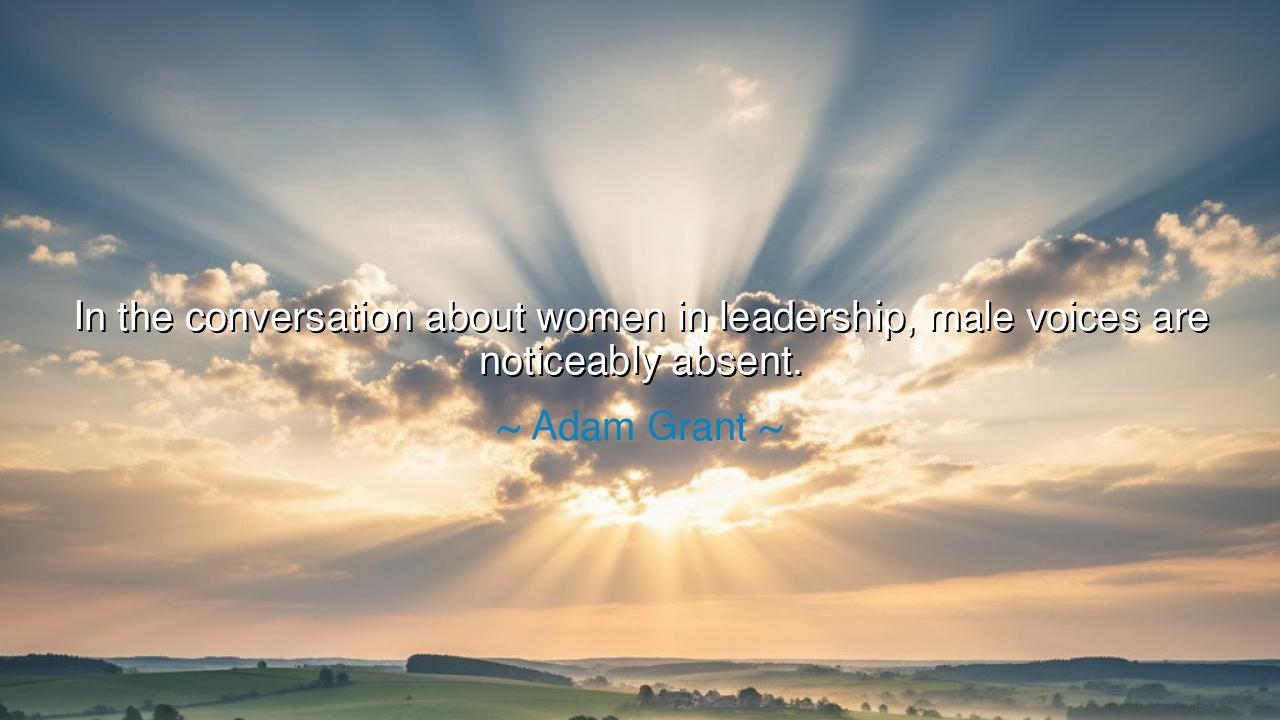
In the conversation about women in leadership, male voices are






When Adam Grant, the organizational psychologist and thinker of our age, said, “In the conversation about women in leadership, male voices are noticeably absent,” he cast a mirror upon our collective conscience. His words ring like a bell in a silent hall—a call not of accusation, but of awakening. For he was not merely speaking of gender, but of responsibility, of the imbalance between the voices who suffer and the voices who hold the power to change what is unjust. Beneath his observation lies a truth as old as civilization: progress requires participation, and silence in the face of inequality is not neutrality—it is complicity.
The origin of this quote lies in Grant’s lifelong work studying leadership, motivation, and human behavior. Through his research and teaching, he saw that even as societies spoke of empowerment and equality, the burden of advocacy fell disproportionately upon women themselves. Men—who still occupy the majority of high positions in government, business, and academia—too often stood aside, spectators rather than participants. Grant’s lament was not born of cynicism, but of moral urgency. For he recognized that until those with privilege use their voices, true equality would remain a distant ideal. His insight echoes through time, reminding us that justice is never achieved when half of humanity fights alone.
History, too, bears witness to this pattern. Consider the suffrage movements of the nineteenth and twentieth centuries. Women marched, starved, and suffered imprisonment for the right to vote—but alongside them, a few courageous men joined the struggle. Figures like Frederick Douglass and John Stuart Mill understood that freedom cannot flourish when divided by gender. Douglass, himself a former slave, stood before crowds and declared that the fight for women’s rights was inseparable from the fight for human rights. Mill, a philosopher and parliamentarian, used his influence to argue for the enfranchisement of women in Britain, even when it cost him political favor. Their voices did not overshadow women’s leadership; they amplified it. They embodied the truth that equality is not a woman’s issue—it is humanity’s issue.
Grant’s words, then, are not a rebuke but an invitation. He calls upon men to enter the conversation—not as saviors, but as allies, as listeners, as learners. For in the ancient order of wisdom, to speak for justice is the duty of every soul who knows what is right. When men use their platforms to honor and elevate the leadership of women, they do not diminish their own authority—they fulfill it. The measure of a true leader, as the ancients taught, is not in how much power he holds, but in how willingly he shares it. Silence, in contrast, is the refuge of those afraid to lose privilege; but in truth, the world grows richer when power is shared.
In every age, voices of courage have broken the silence. In the twentieth century, men like Martin Luther King Jr. not only fought racial injustice but spoke passionately for gender equality, urging that no liberation is complete until all are free. In our own era, many male leaders have begun to follow that example, acknowledging the structural barriers women face and working to dismantle them. But Grant reminds us that these voices are still too few. The conversation about women in leadership remains incomplete when half of humanity speaks and the other half listens without reply. Change demands chorus, not whisper—a harmony of voices, male and female alike, united in purpose.
Let the lesson of Adam Grant’s wisdom resound through the generations: that silence in the presence of inequality is the death of progress. If you hold influence, use it not as a fortress, but as a bridge. Listen to the voices that have been ignored, and echo their truths where your words carry weight. Teach your sons that leadership is not dominance, but service; teach your daughters that their worth is not a gift to be granted, but a truth to be recognized. And to the men of power—join the conversation not as guests, but as partners, for the world cannot heal with one voice missing.
Thus, in the spirit of Adam Grant’s insight, let us remember: leadership thrives when it is inclusive, and justice grows only where all hands labor together. The absence of male voices in the cause of women’s equality is not merely a silence of sound—it is a silence of conscience. The ancients taught that the greatest sin is not ignorance, but indifference. Therefore, let us speak—not to dominate, but to uplift; not to command, but to collaborate. For only when every voice rises for the dignity of all will humanity truly stand in harmony, and the promise of equality become not a dream, but a living truth.






AAdministratorAdministrator
Welcome, honored guests. Please leave a comment, we will respond soon